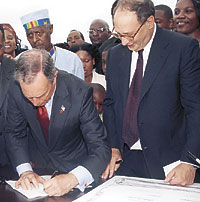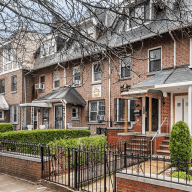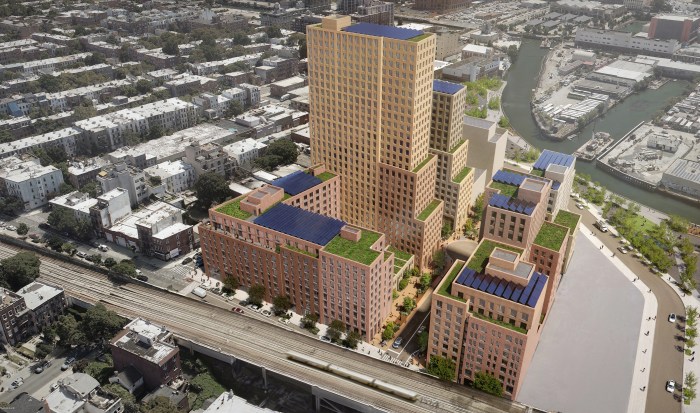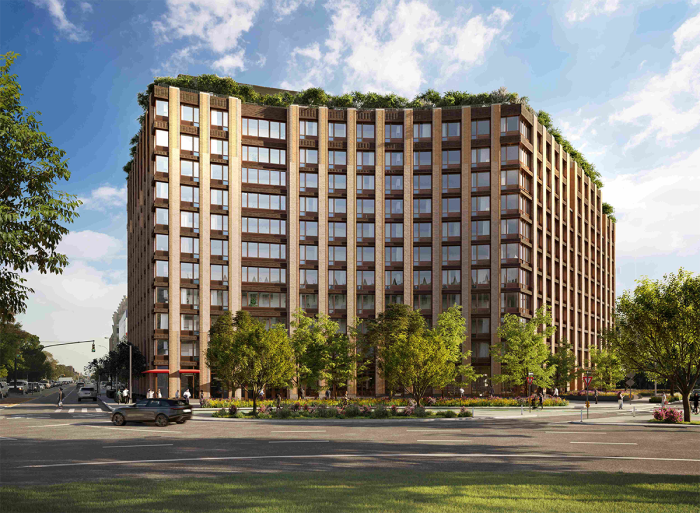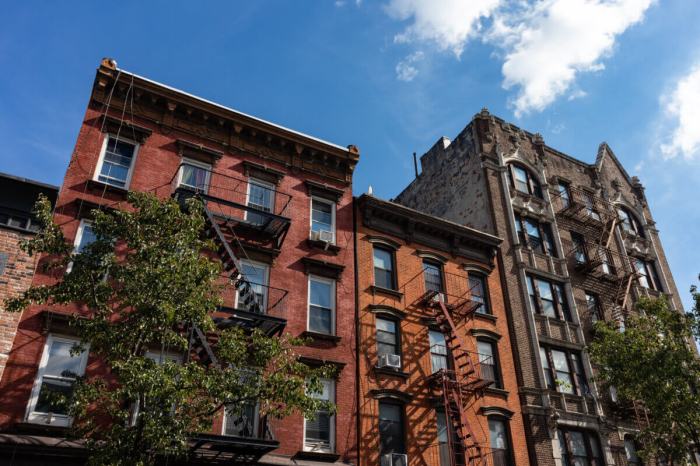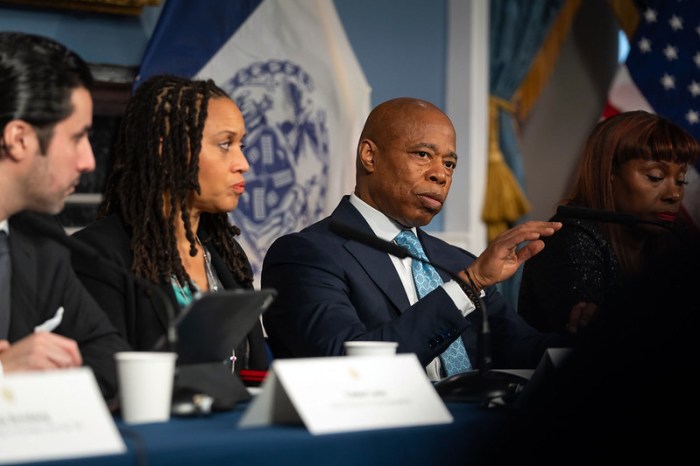Trust Bruce.
That’s the message an annoyed Mayor Michael Bloomberg barked in response
to a question by a Brooklyn Papers reporter regarding developer Bruce
Ratner’s proposed Atlantic Yards development.
At a press conference at Fulton Ferry Landing Monday morning to announce
the creation of a community benefits agreement (CBA) between Ratner’s
Forest City Ratner Companies and a handful of community groups, the mayor
interrupted Ratner, who was answering a question about the enforceability
of such a non-governmental document.
“It’s legally binding,” said Ratner, who seemed pleased
to have been asked the question. “It has in some cases economic penalties,
it has mediation, as well as the ability of community groups to litigate
and get an orderable injunction, and we hope to see the goals fulfilled,
and if we don’t, litigation can be used.”
Bloomberg, however, cut him off in his explanation.
“I would add something else — even more importantly, you have
Bruce Ratner’s word,” he said.
“That should be enough for you and for everybody else in the community,”
said the mayor, directing his comments at the reporter who asked the question.
“This is a guy who — if you don’t understand that, you
don’t know how great this guy is, for Brooklyn and for New York City.”
The announcement of the benefits agreement, proclaimed on a mayoral press
release headlined, “Mayor Michael R. Bloomberg, Forest City Ratner
CEO and President Bruce Ratner and Civic Leaders sign Community Benefits
Agreement,” came after months of concern from groups that were not
participating in the negotiations that the document would be weak and
have no enforcement mechanism.
Before the mayor proclaimed his disbelief that trust in Ratner might not
be enough to assuage public concern, Ratner explained that the agreement
was legally enforceable, and had penalties and adjudication measures in
place that would be overseen by an appointed group of community members.
“Also, in the agreement, the developers have agreed to fund an independent
monitoring agent,” added the Rev. Herbert Daughtry, citing one of
the enforcement clauses in the contract. Daughtry, whose House of the
Lord Church, on Atlantic Avenue near Bond Street, is four blocks outside
the project site, joined the CBA negotiations midway and has been a staunch
supporter of the Ratner plan.
The press conference may have given the impression that the mayor had
signed the document on behalf of the city, when, in the face of photographer
flashbulbs and television cameras, Bloomberg signed his name on the same
paper on which Ratner and the members of eight community groups involved
in the negotiated agreement had signed.
“He was not a signatory,” said Lupe Todd, a spokeswoman for
Forest City Ratner. “He was a witness. The signers were eight people
and Ratner, so technically, no, [Bloomberg] did not sign the CBA. He was
a witness to the CBA.”
Opponents of the Ratner plan were left fuming at what they believed to
be a misleading public relations ploy by the mayor and public advocate
on behalf of the developer.
“I think that the press conference setting and signing was [Karl]
Rove-ian in nature, where there are pictures of the mayor signing something
that he’s not actually signed onto, giving the impression that the
city would have oversight on this agreement,” fumed Daniel Goldstein,
a condo owner in the project site, making an allusion to President Bush’s
top political advisor.
But Goldstein, an organizer of the anti-arena group Develop-Don’t
Destroy Brooklyn, saved most of his wrath for Public Advocate Betsy Gotbaum
who, he charged, had sidestepped her role as public watchdog in attending
Monday’s signing to show her support for Ratner. Gotbaum was a colleage
of Ratner when they both worked in the administration of Mayor Ed Koch.
Gotbaum, who led a lawsuit against the Metropolitan Transportation Authority
for allegedly mishandling the bidding process on another Bloomberg-supported
project, the development of a football stadium over the Hudson Rail Yards
in Manhattan, touted the Ratner undertaking.
“This is a wonderful, wonderful example of what development should
be all about,” said Gotbaum. “To bring all these different groups
together to get everybody on board, to have negotiated like that, Bruce
Ratner, I think we can only praise you to the highest.”
Gotbaum faces a Democratic primary challenge this September from Norman
Seigel, the former head of the New York Civil Liberties Union, who has
been retained to represent property owners, like Goldstein, who may face
eminent domain evictions to make way for the Ratner arena and skyscrapers.
“I am impressed by the broad support for the Atlantic Yards project
from community leaders, public officials and advocacy groups,” Gotbaum
told The Brooklyn Papers at the press conference. “This rare display
of unity is a sign of how strong and beneficial to Brooklyn the project
is. I am confident that any remaining issues can be resolved to the satisfaction
of all concerned.”
Goldstein condemned her stance.
“For the public advocate to come to this thing and endorse it and
not sign onto it, is absurd,” he said. “She should be signing
on to it to enforce it, not just cheerlead it.
Gotbaum spokesman Daniel Browne responded, “She did not sign the
agreement because she is not a party to the agreement. She endorsed it
because she thinks it’s good for the community.”
The mayor’s press office did not return calls seeking comment on
the appearance that he had publicly signed the agreement.
Asked about the mayor’s ceremonial signing of the document, Leonard
Wasserman, chief of economic development for the city Law Department,
affirmed that the “city is not a party to the CBA.”
“I understand that the mayor signed the document — I was not
involved in it at all, and the Law Department was not involved at all
— but the mayor signed the document, in a ceremonial capacity, providing
a sort of official endorsement of the good work of the private parties
in reaching an accommodation on the issues between them,” he said.
Should Ratner fail to make good on any of the many promises outlined in
the CBA, the cost of any litigation to enforce the agreement would fall
on the shoulders — and purses — of the largely faith-based non-profit
organizations that signed on.
“[Litigation] would be between Forest City Ratner and BUILD and all
those people,” said Todd, referring to Brooklyn United for Innovative
Local Development, one of the spearheading groups of the CBA.
“The city is not involved at all, in any of that,” she added.
Goldstein said he was disappointed to see the concerns of many in the
community in which the project would be built overlooked for the sake
of the CBA.
In a press release issued by his organization on the same day as the signing,
Goldstein wrote that 48 “known” community and civic groups,
as well as “three of the district’s four elected officials”
were concerned about or opposed to the project.
“None of these groups have been involved in the ‘CBA’ negotiations,
while all of the groups that have been involved [in negotiating] have
supported the project from the beginning,” wrote Goldstein.
“Those most directly affected by the proposed project have not been
involved either,” he said. Among the 48 groups listed were the longstanding
Park Slope Civic Council, 100 Blacks in Law Enforcement Who Care, the
Fort Green Association, the Creative Industries Coalition and Central
Brooklyn Independent Democrats.


